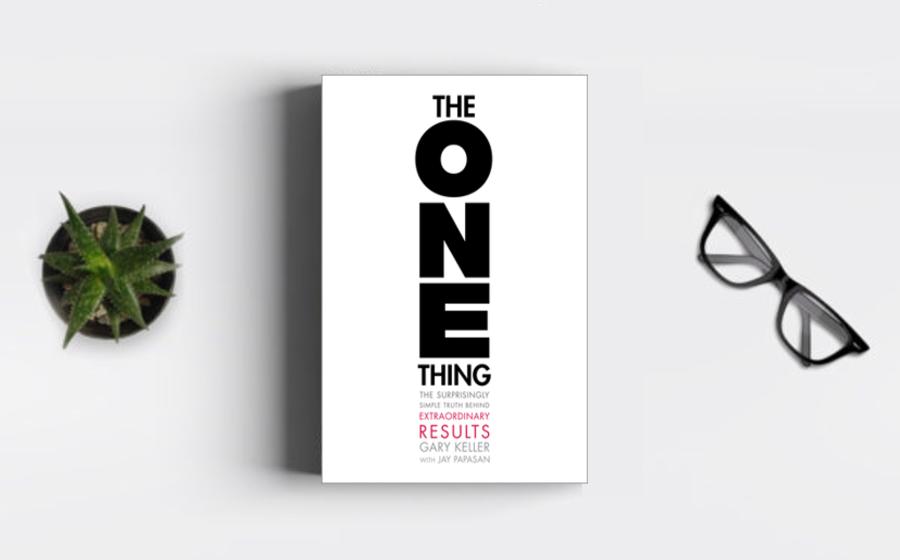"The One Thing" by Gary Keller and Jay Papasan is a
powerful guide to achieving extraordinary results by
narrowing one's focus and concentrating on the most
essential tasks. The book presents a compelling argument
for the transformative impact of simplicity and
prioritization, emphasizing the importance of
identifying and dedicating attention to the single most
significant thing that will drive success in any area of
life.
The central premise of "The One Thing"
revolves around the question: "What's the one thing I
can do such that by doing it, everything else will be
easier or unnecessary?" Keller and Papasan contend that
by honing in on the critical task that has the most
significant impact, individuals can streamline their
efforts, increase productivity, and achieve remarkable
results.
One of the key principles introduced in
the book is the concept of the Domino Effect. Keller and
Papasan assert that identifying and focusing on the one
thing creates a chain reaction, much like a domino
falling and setting off a series of subsequent actions.
By prioritizing the most impactful task, individuals can
initiate a cascade of positive outcomes that contribute
to success in various areas of their lives.
"The
One Thing" also explores the myth of multitasking and
the detrimental effects of spreading one's attention
across multiple tasks. Keller and Papasan argue that
multitasking diminishes the quality of work and inhibits
deep focus, leading to reduced productivity and
increased stress. The book encourages readers to embrace
the idea of sequential monotasking, directing full
attention to one task at a time and achieving a higher
level of efficiency and excellence.
Moreover, the
authors delve into the concept of time blocking as a
strategy for implementing the one thing in daily life.
Time blocking involves dedicating specific blocks of
time to the most important tasks, creating a structured
and focused approach to productivity. By proactively
scheduling time for the one thing, individuals can guard
against distractions and interruptions, fostering an
environment conducive to deep work and meaningful
progress.
In terms of inspiration, "The One
Thing" motivates readers by presenting a pragmatic and
actionable approach to achieving success. Keller and
Papasan's straightforward and accessible writing style,
combined with real-world examples and case studies,
makes the book applicable to a broad audience. The
emphasis on simplicity and prioritization offers a
refreshing perspective on productivity, inspiring
readers to reassess their habits and adopt a more
focused and intentional approach to their work and
lives.
The narrative is enriched by a multitude
of success stories and testimonials from individuals who
have applied the principles of "The One Thing" to
achieve significant results. These stories serve as both
inspiration and evidence of the transformative power of
the book's principles. From entrepreneurs to artists and
professionals, the diverse examples demonstrate the
universal applicability of focusing on the one thing as
a pathway to success.
"The One Thing" also
addresses the importance of setting big, long-term goals
while maintaining a clear focus on the immediate,
smaller steps that contribute to their achievement. The
book introduces the concept of goal setting as a
staircase, with each step representing a smaller,
manageable task that leads to the attainment of the
larger goal. This perspective encourages readers to
break down their aspirations into actionable steps,
making progress more tangible and achievable.
Furthermore, the book explores the idea of purposeful
imbalance, challenging the notion of work-life balance
as an equal distribution of time and energy across all
areas. Keller and Papasan argue that achieving
extraordinary results often requires prioritizing
certain aspects of life at different times. By
acknowledging the ebb and flow of focus and energy,
individuals can avoid the guilt associated with
imbalances and stay committed to their most important
goals.
In addition, "The One Thing" introduces
the concept of the four thieves of productivity:
inability to say no, fear of chaos, poor health habits,
and an environment that doesn't support your goals. The
book provides strategies for identifying and mitigating
these productivity thieves, offering readers insights
into creating a conducive environment for success. By
addressing these common pitfalls, individuals can clear
the path to focusing on their one thing and achieving
exceptional results.
The authors explore the
relationship between purpose and priority, emphasizing
that aligning daily actions with a larger purpose
enhances motivation and fulfillment. By identifying the
one thing that aligns with their purpose, individuals
can infuse their daily tasks with a sense of meaning and
significance. This connection to purpose serves as a
powerful source of inspiration, driving individuals to
persevere in the face of challenges and stay committed
to their most important goals.
Moreover, "The One
Thing" challenges the notion of perfectionism and the
belief that every task must be executed flawlessly. The
book advocates for the pursuit of mastery through
consistent, intentional practice, rather than the
pursuit of perfection. This perspective inspires readers
to embrace a growth mindset, viewing mistakes and
failures as opportunities for learning and improvement
on the path to mastery.
The authors also address
the role of accountability and mentorship in the pursuit
of the one thing. "The One Thing" advocates for seeking
guidance from mentors and creating systems of
accountability to stay on track toward achieving one's
goals. By leveraging external support and
accountability, individuals can enhance their focus and
resilience, creating a collaborative environment that
fosters success.
"The One Thing" is a transformative guide that inspires individuals to achieve extraordinary results by focusing on the most essential tasks. Gary Keller and Jay Papasan's evidence-based insights, real-world examples, and practical strategies offer readers a roadmap for simplifying their approach to productivity and achieving greater success. By challenging the myths of multitasking, embracing simplicity, and prioritizing the one thing that matters most.






